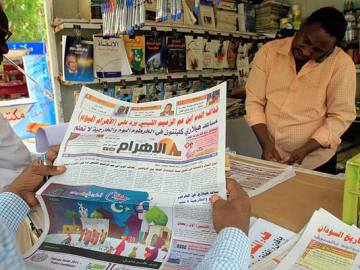Sudanese security seizes copies of two newspapers
September 14, 2014 (KHARTOUM) – The National Intelligence and Security Services (NISS) confiscated the Sunday editions of al-Youm al-Tali and al-Akhbar newspapers at dawn from the printing house.

The journalist, whose name is being withheld for his safety, said that NISS officials described as unacceptable the publication of interviews with armed rebellion figures along with their pictures.
He expressed surprise as the statements given by Arman and Ibrahim in these interviews were positive and in line with the government-led national dialogue process.
Sudanese journalists complain that media houses are coming under a fierce and frequent crackdown from the NISS through measures that include confiscation, suspension and pre-publication censorship.
Newspapers say that NISS intentionally seeks to inflict heavy financial losses on them through these measures.
The security apparatus however accuse some newspapers of breaching the “red lines” in publishing news that affect the national security.
This week Sudan’s second vice-president, Hassabo Mohammed Abdulrahman, announced that the presidency had decided to suspend pre-publication censorship carried out on newspapers.
This is not the first time the government has declared an end to censorship before re-imposing it.
Last May, NISS director Mohamed Atta Abbas al-Moula ordered the suspension of al-Saiha after it published stories on corruption at the justice ministry. The famous amongst which was the corruption accusation against the current undersecretary of the justice ministry, Esam al-Din abdel-Gadir.
The Sudanese minister of information Ahmed Bilal Osman said at the time that the NISS has the legal right to suspend al-Saiha and any media raising confusion and dissension in the country.
Sudanese newspapers received four orders during the month of May banning publication of high profile issues which prompted the Council of Press and Publications to criticize prosecutors’ for expanding the use of this authority.
The distribution figures of the 20 political newspapers show a decline by more than 50% in 2013 compared to 2012, while 12 other shut their doors during the past year.
(ST)
